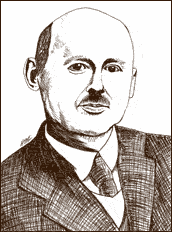
 |
|
|
|
|

Dr. Robert Hutchings Goddard, considered by many to be the father of modern rocketry, was a physicist of great insight who had a genius for invention. Along with Konstantin Tsiolkovsky of Russia and Hermann Oberth of Germany, Goddard envisioned the exploration of space. Born in Worcester, Massachusetts, Goddard graduated from Worcester Polytechnic Institute (WPI) in 1908 and remained at his alma mater as a physics instructor. That same year he began graduate work in physics at Clark University and received his Master's and Doctorate degrees in 1910 and 1911, respectively. In 1912, Goddard became a research fellow at Princeton University and in 1913 developed the mathematical theory of rocket propulsion. The following year he joined the faculty at Clark University. In 1915, he proved that rocket engines could produce thrust in a vacuum, therefore making space flight a practical goal. Goddard became a full professor at Clark in 1919. next: Rockets |
 On the Shoulders of Giants
Top: A portrait of Robert Goddard. (Drawing by Hailey King) | ||
|
Subscribe to the Earth Observatory About the Earth Observatory Contact Us Privacy Policy and Important Notices Responsible NASA Official: Lorraine A. Remer Webmaster: Goran Halusa We're a part of the Science Mission Directorate |
|
|